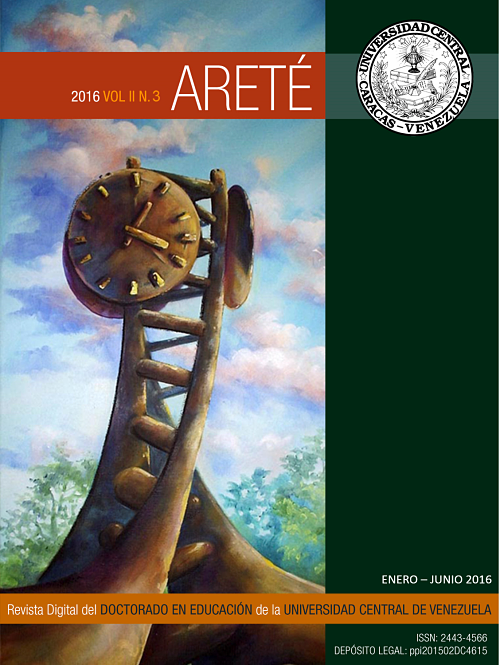La “Hija Del Pecado”. La República Post Independentista del Siglo XIX en Textos Escolares Venezolanos
Keywords:
Representaciones discursivas, relato histórico, libros de texto, república, culto cívico bolivariano, Discoursive representations, historical account, textbooks, republic, political system.Abstract
Downloads
References
Adam, J. M. (2005). La linguistique textuelle. Introductionà l’analyse textuelle des discours. Paris: Armand-Colin
Bonnin, J. (2012). Génesis política del discurso religioso. Iglesia y comunidad nacional (1981) entre la dictadura y la democracia en Argentina. Buenos Aires: EUDEBA.
Caballero, M. (2006) ¿Por qué no soy bolivariano? Caracas: Alfadil.
Capriles, A. (2008). La picardía del venezolano o el triunfo de tío conejo. Caracas: Taurus.
Carrera Damas, G. (1969). El culto a Bolívar. Caracas: Ediciones de la Biblioteca de la Universidad Central de Venezuela.
Carretero, M. y Kriger, M. La usina de la patria y la mente de los alumnos. En: Carretero, M., Rosa, A. y González, M. (comp.)(2006). En enseñanza de la historia y memoria colectiva. Buenos Aires: Paidós. pp. 161-188.
Grize, J. B. (1990). Logique et Langage. París: Ophrys
Harwich, N. (2003). Un héroe para todas las causas: Bolívar en la historiografía. En Revista Iberoamericana, III, 10, pp. 7-22.
Moscovici, S. (1979). El psicoanálisis, su imagen y su público. Buenos Aires: Huemul.
Pino Iturrieta, E. (2010). El divino Bolívar. Caracas: Alfa.
Straka, T. (2009). La épica del desencanto. Caracas: Alfa.
van Dijk, T. (2003) “La multidisciplinariedad del análisis crítico del discurso: un alegato a favor de la diversidad”. En: R. Wodak y M. Meyer (Comp.). Métodos de análisis crítico del discurso ( pp. 143-178). Barcelona: Gedisa.
van Leeuwen, T. (1996). “The representation of social actors”. En: C. Caldas-Coulthard y M. Coulthard (Eds.), Texts and Practices. Readings in Critical Discourse Analysis (pp. 32-70). London: Routledge.
Viso, A. B. (1982). Venezuela: Identidad y ruptura. Caracas: Alfa.
Downloads
How to Cite
Issue
Section
License
This journal provides free, immediate access to its content under the principle of making research freely available to the public, which fosters a greater exchange of global knowledge.
Authors who publish in Areté, Revista Digital del Doctorado en Educación, agree to the following terms:
- Authors retain copyright and grant the journal the right to be the first publication of the work, as well as licensed under a Creative Commons Attribution License that allows others to share the work with an acknowledgement of authorship of the work and initial publication in this journal.
- Authors may separately establish additional agreements for the non-exclusive distribution of the version of the work published in the journal (for example, placing it in an institutional repository or publishing it in a book), with an acknowledgement of its initial publication in this journal and not to be used for commercial purposes.
- The contents and images included in the articles are the responsibility of the author(s). Areté, Revista Digital del Doctorado en Educación, is not responsible for the information included in them.
- Authors agree with the license of use used by the journal, with the self-archiving conditions and with the open access policy.
- Authors are allowed to disseminate electronically (e.g., in institutional repositories or on their own website) the published version of their work, as it favors its earlier circulation and dissemination and thus a possible increase in its citation and reach among the academic community.
- In case of reuse of published works, the existence and specifications of the license of use must be mentioned, as well as the authorship and original source of publication.







